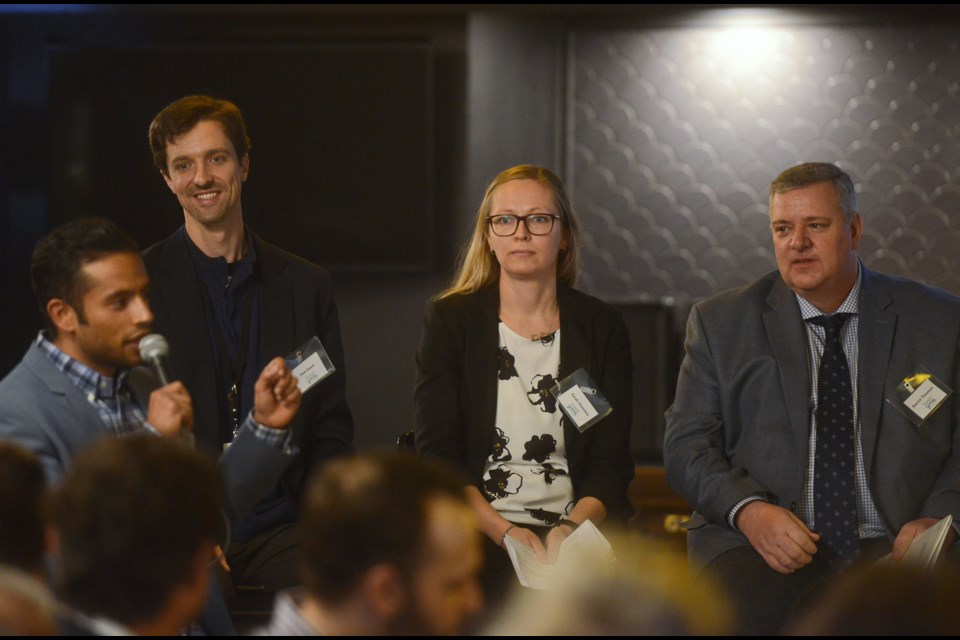Guelph's community leaders were talking about what can and is being done locally to address global issues on Tuesday.
The Community Leaders Breakfast at La Reina Restaurant brought together roughly 75 of Guelph's business, charitable and government leaders. The event, now in its fourth year, kicked off Guelph Gives in the Royal City.
It was part of Guelph Gives, the local efforts that are part of Giving Tuesday, an international day held the Tuesday after American Thanksgiving used to create a day of charitable giving.
While there are many local initiatives, Tuesday's breakfast event looked at what some areas in Guelph are doing to address the 17 Sustainable Development Goals set out by the United Nations, which range from eliminating poverty and gender equality to climate action and reduced inequalities.
Event organizer, Emma Rogers, said Guelph Gives is a springboard to mobilize locally.
"We know that Guelph is great in terms of financial give-back and in terms of volunteerism. We kind of knock it out of the park. What can we do to take that another step further?"
The answer, she said, is "taking a bigger piece of the pie" to not only help the people of Guelph, but also helping people around the world.
Following breakfast, a panel discussion was held to discuss local action that featured City of Guelph CAO Derrick Thomson, The Co-operators sustainability manager Tom Ewart and Sarah Haanstra, project manager for Toward Common Ground, the project that centralizes local data and information about our community.
The theme was how Guelph can work together to address the Sustainable Development Goals locally.
"When I think of the SDG's, they could almost be an umbrella for the many, many local, regional, national, international efforts or group of people who are coming together to address complex issues," Haanstra said in discussing a holistic approach to battling complex issues.
"I think if we're tackling those issues from all sides, I think we have a much better shot at success."
Haanstra said the United Nation's goals are complex and important, but it's important to also think locally.
"If you don't grab onto something that really matters to you and kind of dig deep and tackle it, you can really get lost in that high level. There's so much to think about," she said.
On that specific local level, Ewart talked about efforts The Co-operators are making in the goal of gender equity as one of several of the Sustainable Development Goals his company is addressing.
He said 65 per cent of The Co-operators staff are women, but only 24 per cent of its executives and 24 per cent of its board of directors are women.
"We've acknowledged this as an issue, as a challenge, and something that needs to be addressed," Ewart said, adding that the company is putting programs into place to address it.
"It's really identifying where you are in terms of progressing" on the Sustainable Development Goals "and putting into place plans in order to address those issues and communicating them transparently."
Thomson touched on the city venturing into areas that a municipality traditionally hasn't, including its Community Energy initiatives, carbon footprints and the city's goal of being net zero in its carbon footprint as well as being 100 per cent renewable in its energy use.
"These things allow us a framework to work in that space which typically, for a long time, local governments have not worked in that space," Thomson said. "We're one of the few municipalities actually working in that space right now."
The city CAO also said that finding and taking advantage of partnerships is something the city strives for. In the city's Circular Food Economy project, a combined bid for a $10 million government grant aimed at addressing food security, he said the city has engaged over 100 different partners.
"Even if we're not successful in getting the $10 million, the amount of partnerships and networking connectivity we've created through this project will last a lifetime ... You don't see that level of partnerships in many communities," Thomson said.
He said that it's not just enough for organizations to say they want to give and improve the world on a local level, "you have to walk the talk."
